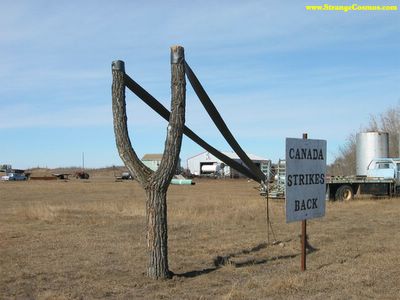Canada's Military: freedom isn't free
Canada's Missile Defense System


A few days ago, one of my readers Annette commented here that "Canadians are allowed to appear passive because they have the U.S. on its borders doing the dirty work for them." Annette's comment is only partially true: Canada is not passive because they have the US here to do the dirty work, they are considered passive because their government is too cheap to buy the Canadian military the equipment they need to be truly effective in what they do.
Canada has participated actively in most of the military actions the US has been involved in: World War II, the Korean War, the first Gulf War, the NATO operation against Yugoslavia, and the NATO invasion of Afghanistan. In fact, in the past 30 years, the only US wars that Canada has not been involved in are the Vietnam War, and the current Operation Iraqi Freedom. However, Canada's military has been so short-changed by years of government neglect that its contributions cannot help but be dwarfed by the American contribution.
In Yugoslavia, for example, Canadian CF-18 fighter jets were very active: Canadian laser-guided bombs accurately hit their targets 75% of the time, and Canadian pilots were well regarded enough that Canadian pilots led more than half of the joint missions in which they were involved. However, since Canada only sent eighteen CF-18 fighter jets out of approximately 800 airplanes involved in that mission, Canada's military contribution was just a drop in the bucket. And, since Canada does not have any refueling aircraft, Canada's contribution to the Yugoslavia operation was delayed, waiting for American refueling planes to ferry the Canadian fighter jets across the Atlantic.
A few weeks ago, I had the pleasure of reading Shaking Hands with the Devil, the first-hand account Romeo Dallaire of the Rwandan genocide ten years ago. Dallaire was the Canadian general commanding the United Nations effort in Rwanda. Dallaire's book describes one of the skills the Canadian troops had significant experience with, and which they found very handy in Rwanda: scrounging. When your government doesn't give you the equipment you need to do the job, you have to beg, borrow, buy, and occasionally steal just to get the job done. Canadian soldiers have been forced to become experts at making do with what they have, at at the classic art of scrounging for what they need to do the job, and as a result their lives have been unnecessarily put at risk. A number of Canadian pilots have been killed in the old and decrepit Sea King (a.k.a. "Sea Thing") helicopters, and as I wrote a few months ago, several Canadian sailors were hurt when one of the used lemon submarines they bought from Britain broke down on the way back to Canada.
Canada's chronic neglect of its military is a source of shame for me, and should be a source of shame for many Canadians. As a Canadian, I feel proud of our Canadian soldiers, who have proven themselves effective despite the lack of support from Canada's government, but I feel ashamed that Canada's government has put them in that situation. And, I feel a particular sense of shame that our allied brothers and sisters (America, Britain, Germany, etc.) have been holding up Canada's end of the load in terms of defence. Canada is a rich country, and does not need to accept other countries' charity like that.
Canadian soldiers have made a valuable contribution to a number of joint actions, and have been particularly prized for their support of United Nations peacekeeping missions. Given that these missions are such a source of pride for Canadians, why does Canada's government neglect the military by denying them the funding and the equipment they need to be truly effective?
Canada's military spending is a national disgrace, and a slap in the face to my father, my grandfather, and all the honourable men and women before them who served in the Canadian Forces. I do hope the Canadian government wakes up soon and starts giving military spending the attention it deserves.



<< Home